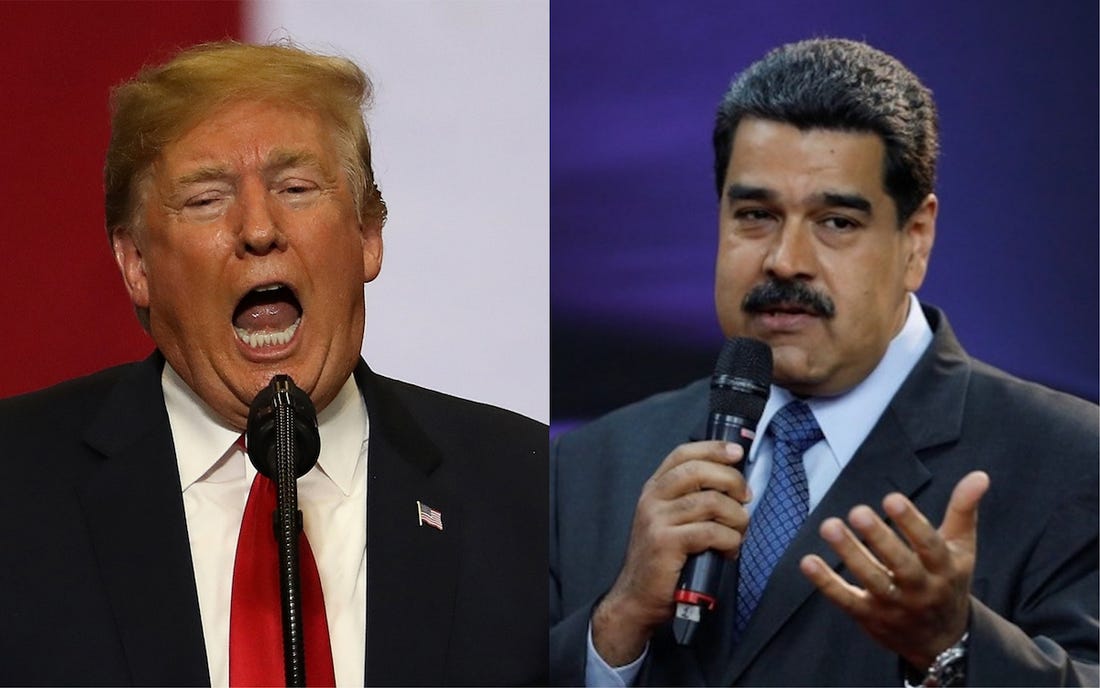
President Trump Backtracking on Meeting Maduro and Venezuela’s effect on the 2020 Election
Nearly five months after President Donald Trump invited Venezuela’s opposition leader Juan Guiado to this year's State of the Union, he's backtracked on giving…
Ever since Jan. 2019 President Trump and the United States have recognized Juan Guiado as the legitimate leader of Venezuela.
The administration quickly tried to get many countries to follow in their steps and soon over 55 countries regarded Guaido as the country’s interim president. The campaign to depose Nicolas Maduro has dragged on for a year and a half without significant progress and Trump told Axios on Friday June 19, that he was open to meeting with Maduro.
“I would maybe think about that. ... Maduro would like to meet. And I'm never opposed to meetings — you know, rarely opposed to meetings,” he said at the time.
However, on Sunday, June 21 the president switched course and outlined that he would only meet with the Venenzuelan leader to discuss his exit from power.
This came after people interpreted his interview with Axios as an indication that he was losing confidence in Juan Guaido’s chances of unseating Maduro.
When asked whether he regretted taking John Bolton’s advice to recognize Guaido, Trump seemed indifferent on the matter.
"I could have lived with it or without it, but I was very firmly against what's going on in Venezuela," he said.
Trump expressed a willingness to meet with Maduro back in Sept. 2018. The Venenzuelan leader was open to having a sit-down meeting both then in 2018 and recently when Trump brought the possibility up again.
On top of recognizing Guaido the United States’ economic and diplomatic efforts have not pressured Maduro to step down.
According to the Federation of American Scientists, the Trump administration had imposed sanctions on Venezuela's state oil company Petróleos de Venezuela, S.A. and Russia’s Rosneft oil company for helping Maduro get around those sanctions.
Venezuela was already suffering from an economic crisis and this, coupled with the country’s own internal corruption, led hyperinflation in the petrostate to reach 10 million percent last year.
In John Bolton’s new book In The Room Where it Happened, Trump’s former national security advisor alleged that the president said it would be “cool” to invade Venezuela and that the South American country was "really part of the United States."
This was trying to paint Trump as the one eager to launch a military invasion into Venezuela.
President Trump did not help himself in disproving this notion because his administration recently failed trying to delay the sale of Bolton’s book and cited that some of the contents in the book could impose a national security risk. When Bolton was still part of the administration, he continuously said that “all options were on the table” when asked about using U.S. military forces to support Guaido.
Bolton revealed his perception on working with Trump and his temperament in his new book, but refused to testify during the House impeachment inquiry.
“I would bet you a dollar right here and now, my testimony would have made no difference to the ultimate outcome,” he said at a lecture at Vanderbilt University in February.
Former Vice President and presumptive democratic nominee Joe Biden recently also weighed in on Trump thinking about meeting with Maduro.
“Trump talks tough on Venezuela, but admires thugs and dictators like Nicolás Maduro,” he tweeted.
Biden then held a virtual fundraiser on Monday, June 22, and when talking about Maduro said: “He’s not really a dictator, or something to that effect. Good Lord.”
RELATED CONTENT
He also expressed that he would have met with him, unlike Trump.
This comes as a surprise as the former vice president was critical of his opponent when he met with North Korean dictator Kim Jong Un in January of last year.
Biden told outlets that he would not have met with him without preconditions and was critical of the usefulness of the meeting.
"Look, we gave him everything he’s looking for. The president showed up, met with him, gave him legitimacy, weakened the sanctions we have against him," said Biden
Both candidates agree on the basis that the 2018 elections in Venezuela that saw Nicolas Maduro win a second term were fraudulent. They both also want to see him step down and they want to restore democracy in the region.
When speaking to the Council on Foreign Relations Biden questioned the end goal for the Trump administration’s involvement in Venezuela.
“The Trump Administration appears more interested in using the Venezuelan crisis to rally domestic political support than in seeking practical ways to effect democratic change in Venezuela,” he said.
The truth is that both candidates need to be cautious about how they speak on the regime in the South American country as Venezuelans make up a large portion of the Latinx voting bloc in the swing state of Florida.
Venezuelan-Americans who are against the regime might be dissuaded from voting for Trump if he meets with Maduro as that could legitimize him and shows that backing Guaido did not work.
The same goes for Biden if he continues to say that Maduro is not a dictator.
No matter who wins, Venezuela will continue to be a sensitive issue, but if either escalates tensions to the point of using U.S. forces to unseat Maduro it will go against their shared goal of restoring faith in the country’s democracy.











LEAVE A COMMENT:
Join the discussion! Leave a comment.